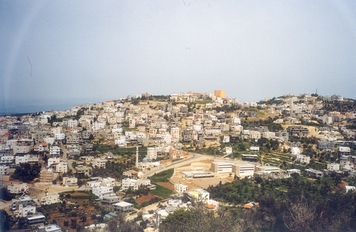
View of Umm al-Fahum, Galilee
|
 View of Umm al-Fahum, Galilee |
| Umm Riadh 'Arafat, Mashhad (Galilee), April 14:
|
|
Jamil 'Arafat picks me up from the 'Ayn (well), a bus stop and Nasra landmark. Today he is going to take his latest manuscript, a study of the villages around Haifa, to a printer in Nasra. He is his own publisher and distributor, with several books to his credit. I haven't heard his name mentioned by Palestinian intellectuals in the diaspora. Palestinians in Israel seem to be cut off from Arab and even Palestinian publishing circuits and cultural life.
On the way to the publisher we met several of Jamil's friends, including the only Arab member of Israel's High Court. On the way to his home in Mashhad, Jamil (Abu Riadh) tells me that he is taking me to record with his wife. Though not multiply displaced, she has a rather special story since when her parents left Palestine in 1948, she stayed behind, aged eight years, with her grandparents. Later they were forced to flee as refugees to Nasra. Jamil married her as a quasi-orphan, though her father had owned land in Mjeydal. The 'Arafat household is large and bustling with adult and almost adult children (they have 15 children and 25 grandchildren). It's on the edge of Mashhad. Across the valley is a green hillside -- and the usual settlement. Abu Riadh waves his hand towards it: "Our land!" Umm Riadh's story is indeed special, and her gentle, dignified demeanour impresses me deeply. I'm happy that chance brought me here even though, at the beginning, I feared that I was yet again breaching my sampling criteria. Her emphasis on 'waiting' as primary characteristic of post-Nakbeh Palestinian existence resonates with the talk of refugees in Lebanon. It's life suspended, not a proper life. Such lives can only be made sense of through belief in the return of "our children's children".
Umm Riadh starts to speak: |
recently it's possible. I used to call them using the phone only. See! I met my father after 47 years, four years ago, for the first time [since the Nakbeh]. And I saw one of my sisters a year ago, after 50 years. We were young [when the Nakbeh happened]. She was younger than me - we were all young children, one after the other. I was the second (child). There's a sister who's older than me. There were younger ones, there was one who was still suckling. (They took them?) Yes. (They left you behind?) They didn't leave me. I loved my grandmother and grandfather, I loved them a lot. They also left my older sister. But she, after a year - they used to go by way of Jordan - she left with my grandmother's sister. They left meaning to come back, but they didn't. They left me - I stayed with my grandmother and grandfather, on the basis that they would be back this week or next month, the return, the right to return - that kind of talk. They filled us with it for fifty years. Khalas! Everyone stayed in a different place, waiting to come back. And we waited for them to come back..."
After this recording is finished, I record with Abu Riadh, not about his life but about his work as an oral historian. 17 I'm delighted to find that he holds women in high regard as tellers of history. There's another Palestinian male view I have sometimes encountered, that women 'know' nothing, they are uneducated, their 'facts' are unsound. But Abu Riadh particularly praises the clarity and detail of memory of several old women he knows. I wish I had time to meet them. On the return to Nasra, Jamil speaks about the attitude of Palestinians who left in 1948 towards those like himself who stayed: "They looked on us as spies, as collaborators. But we are the ones who stayed steadfast". Building negative stereotypes of each other is a Palestinian fault that the Nakbeh has deepened. I've come across similarly misinformed ideas in the West Bank about the refugees in Lebanon. Back with the 'Soeurs' in Nasra, I'm on the phone for new contacts. I want to reach Akka, al-Bassa, and the villages of Upper Galilee. There's someone originally from Kfar Bi'rim, a destroyed village on the border with Lebanon, who is ready to take me north to record with women from there. His name is Kamal Yacoub. |
| 17. See al-Jana, special issue on Palestinian oral history, Beirut, 2002. |
[Rawiya Saffouri Shanti] [Umm Fawzi Shakhour] Copyright©2005 |
|